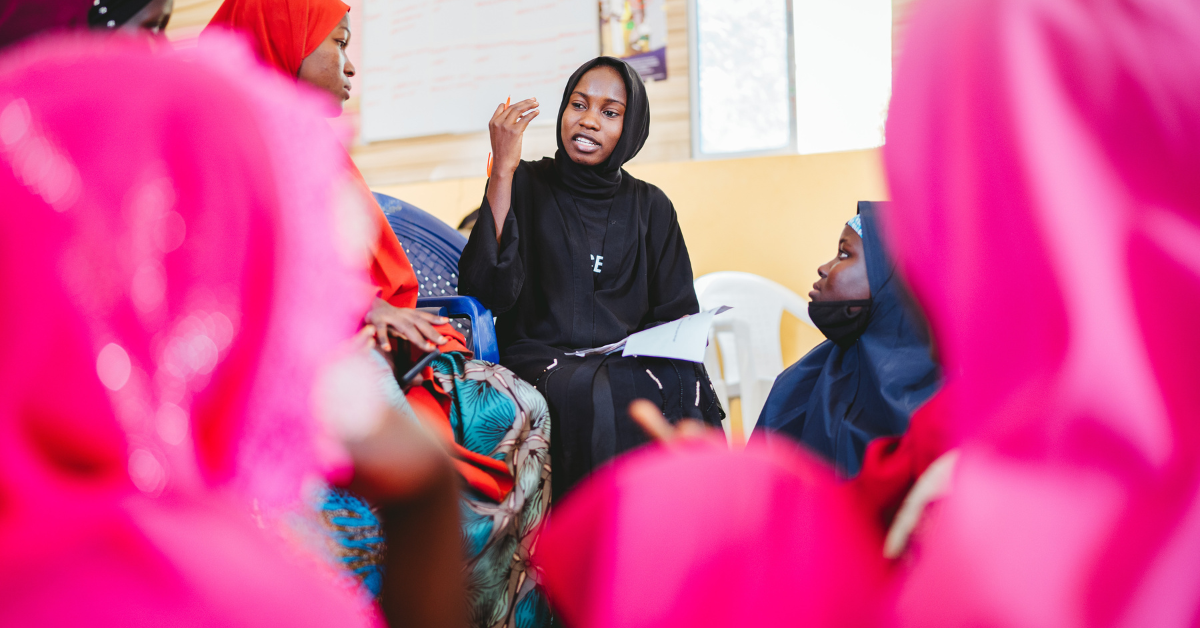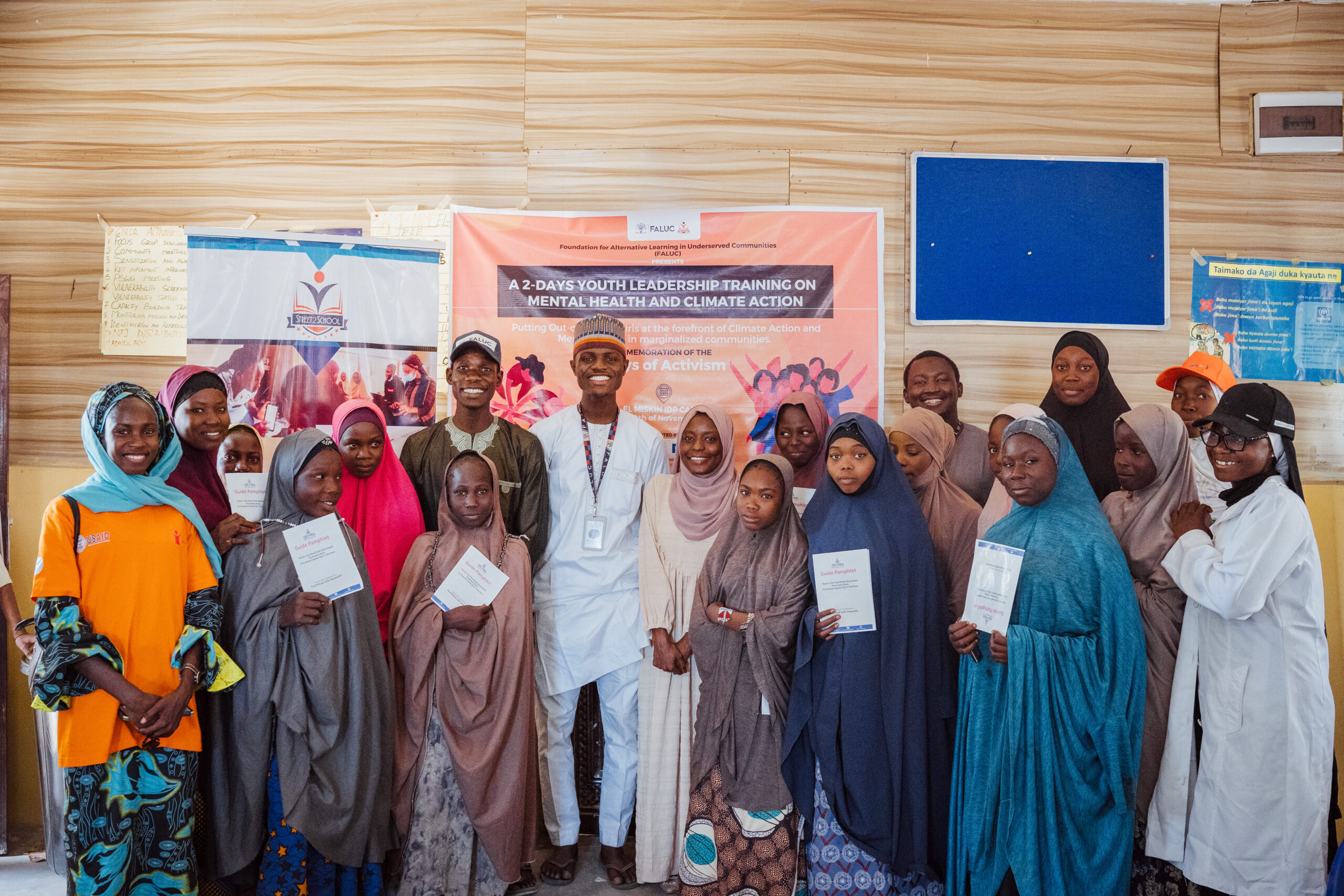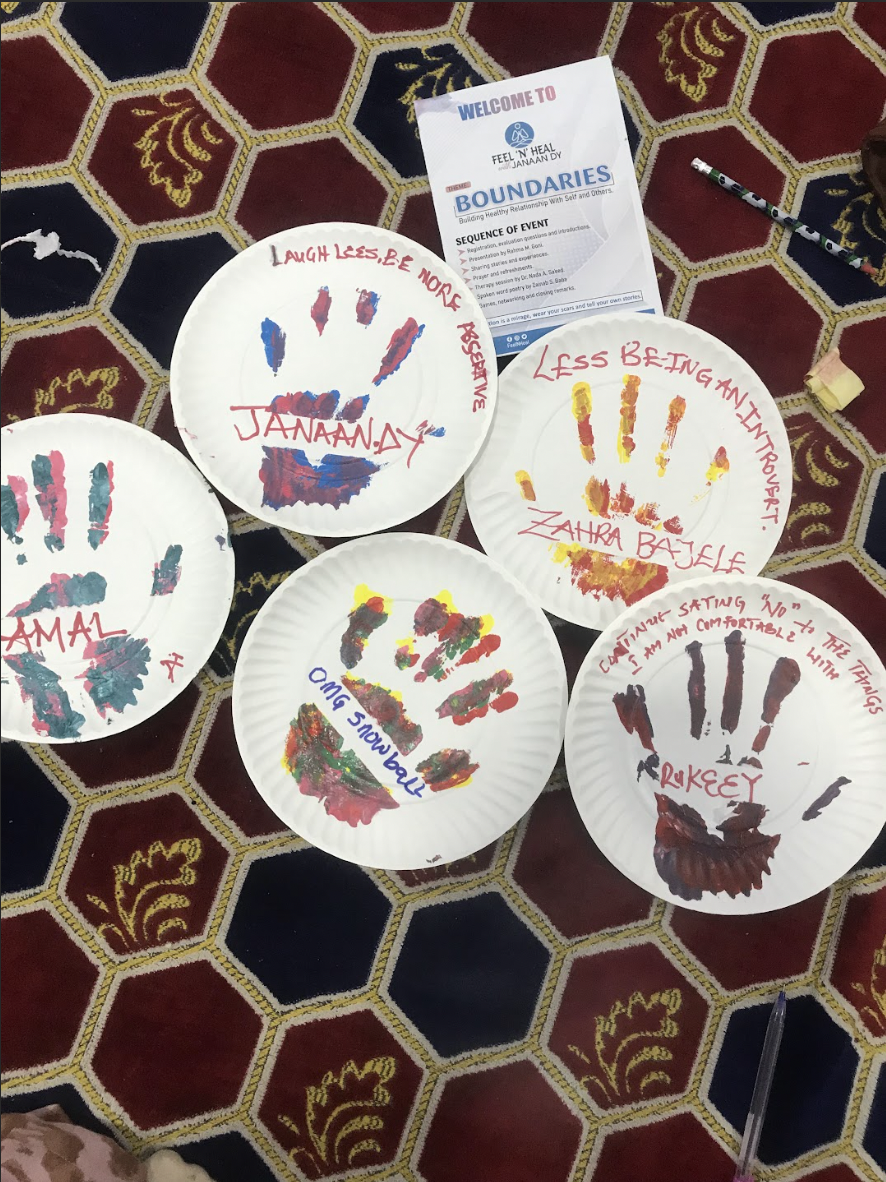From a WhatsApp platform to physical sessions, this Nigerian initiative is helping women affected by conflict navigate their trauma
- Founded in Nigeria in 2020, FeelNHeal aims to help displaced conflict survivors deal with mental health disorders. Through physical and virtual group sessions, the initiative has helped create a safe space for over 800 people to share their experiences and prioritize their mental health.

Maiduguri, Nigeria (Minority Africa) – In 2015, amid the Boko Haram insurgency, Hassana Danyerwa, the founder and creative director of FeelNHeal, was battling a traumatic experience that stayed with her for years. During that time, she had nightmares and would spend the night crying, wallowing in pain, but the next day, she’d wear a big smile and refuse to let her family and friends see she was hurting.
“I was always trying to be in the midst of friends or get myself busy with work or studies to distract myself from my reality,” Hassana tells Minority Africa. “I couldn’t ask for help because I didn’t even think anyone could help me, and I didn’t want people to start feeling sorry for me or make my struggles a topic of discussion.”
In 2019, it dawned on her that she needed to find a way to heal, so she started telling people about what she’d been through on her WhatsApp status. After years of keeping it to herself, it was difficult to do, but she felt healing would be far from her as long as she failed to open up. “There are people who read and judge, but the most incredible thing is that there are more people who relate to the stories I share and even share their own experiences with me,” she says.
Realizing she was not alone and that writing could be a form of therapy, Hassana eventually sought help from a professional therapist and, in February 2020, created FeelNHeal, a local initiative focused on mental health challenges faced by young girls and women living in conflict-affected environments.
The initiative was born out of Hassana finding out that a high number of women in her community didn’t know what mental health was. To combat this, Hassana and her team began going to schools, orphanages, and host communities of internally displaced persons (IDPs), creating awareness about mental health and providing emotional support to people battling mental disorders by organizing physical and online group sessions.

According to Statista, between 2011 and 2022, the northeastern part of Nigeria has suffered deadly attacks from Boko Haram that have claimed thousands of lives. Whereas forcing millions to flee their homes. As a result of the crisis, most conflict survivors who are now displaced suffer from post-traumatic stress disorder (PTSD) due to the loss of relatives and loved ones. The World Health Organization (WHO) determined that one in five displaced persons is affected by mental health disorders. It is an estimate that translates to over 400,000 internally displaced persons in Nigeria.
Nigeria’s president Muhammadu Buhari signed a mental health bill into law earlier this year after two failed attempts. While there’s hope that the intervention will lead to giant strides in mental health led by the agencies and individuals responsible for implementing it, mental health awareness and care are still in their early stages in Nigeria.
Last December, to mark 16 days of activism, FeelNHeal trained 30 young women on mental health and trauma resilience through a partnership with the Foundation for Alternative Learning in Underserved Communities (FALUC). From online sessions to physical sessions, FeelNHeal has impacted over 800 lives, most of whom are conflict-affected women and children.
One of the physical sessions, tagged “Being a Woman,” was held in June 2022 and left Khadijah Jimeh, a young writer and poet, with a different view of the environment around her. After the session, Khadijah had to call her dad and talk to him.
“When he asked me why I was crying, I told him I missed him and wanted to see him, my mom, and my siblings,” she says. “At that moment, I didn’t care about anything! Not my degree, not my art of creative writing or poetry, not the zeal to strive and be better. Nothing mattered to me! This is to tell you how intense that event was.”
Khadijah found the environment where the session took place comforting and felt safe being in a room with people who were good listeners and had experienced the tragedy of death in their lives. “The next biggest thing I learned was that everyone, every single person I interact with, whether in school, at home, online, or offline, has a battle they are fighting,” she says. “Every human has a battle that’s making them think of giving up or taking a step back, so the best thing I can do is not be part of their misery when interacting with them. I should be the one who makes them smile and make them strive harder. Life is difficult, but I can be the source of someone’s smile in a few seconds.”
“This has made me cautious of how much I respect people, how much I use kind words, and how much I compliment people because I know it will make a difference in their life, maybe for a day or two, or an hour or even five minutes, but it did, right? Actions make differences,” she adds.
Adama Muhammad was six years old when the conflict in Borno State broke out. Before schools in the state were shut down, she went to school to the sounds of gunshots and attended classes feeling scared that something terrible would happen to her, all of which affected her mental health.

Adama started painting to prioritize her mental health and create therapeutic pieces of art and designs for people, so when she came across FeelNHeal’s instagram page, she felt it was the right place for her.
“The session I had was about boundaries. I learned so much more than I expected. A lot of stories were shared. We laughed, some of us cried, and we had fun,” she says about attending a physical session in February 2023. “It was a safe space for self-awareness, expression, motivation, sharing and receiving knowledge. At the end of the healthy session, I learned more about myself, about boundaries, how necessary it is to create boundaries and how important they are to our mental health.”
There is a misconception among some people that mental disorders are spiritual attacks, instead of health conditions that can be treated. Dr Nada Abdulwahab Sa’eed, a physician and mental health expert at the University of Maiduguri Teaching Hospital (UMTH), emphasizes education as a useful tool to address the misconception.
“This is important because you will find that most ‘common people’ do not argue about the existence of mental illnesses,”she says. “They agree that there are certain illnesses psychiatrists can treat. But they think spiritual illnesses are common while mental illnesses are rarities since they do not know that many of the symptoms they see are those of mental illnesses.”
Dr Nada also explains that radio and TV stations have more awareness than in the past few decades. Even the medical school curriculum has now been improved to help doctors better understand mental illnesses, and it has brought so much growth in reducing stigma and improving the mental health of people adversely affected by the insurgency.
“All we need to do is keep the momentum. Use symptoms that are commonly experienced in our environment to create awareness while at the same time respecting the spiritual beliefs of people and showing them how mental illnesses can be treated without disregarding their beliefs,” she says.
However, acknowledging that a significant proportion of women experience challenges that severely affect their mental health whether they are young or old, employed or not, married or not, mothers or not, Dr Nada highlights the channels to follow for them to improve their mental health. “Placing priority on getting an education, Western and religious, as a means of empowerment and awareness. It is a common misperception in our society that women do not need to pay attention to education since they will not need to work and earn for themselves,” she says. “As a result, even girls who are enrolled in school do not take education seriously. Improving their financial status, actively seeking ways of improving their awareness of mental health, seeking help from professionals when in distress and participating in support groups.”
In these communities where women are often thought of as less, the FeelNHeal initiative is defying societal norms and giving these young women a platform to speak and heal from their past experiences. As the initiative aims to provide them with psychosocial support, its main objective is to champion meaningful advocacy that will encourage resilience in their hearts.
“At FeelNHeal, we also link persons experiencing mental health issues with a professional therapist where they can have their conditions diagnosed and get the help they need,” Hassana says. “We also include painting, writing, and playing games in our physical sessions as a healthy coping mechanism because we believe unless provided with a healthy way of coping, victims of violence tend to resort to violence as their coping mechanisms.”
Making such contributions to these communities through FeelNHeal brings Hassana so much happiness and satisfaction, and she doesn’t think of monetary profit. But with increased funding, Dr Nada feels that the initiative could reach more people and make its projects sustainable.
Edited by Banjoko Samuel and Uzoma Ihejirika
Yahuza Abdulkadir is a freelance writer and journalist from Northern Nigeria. He reports mostly on solution and development journalism. He has a deep passion for storytelling and literary art, promoting black culture, and voicing minority issues.


